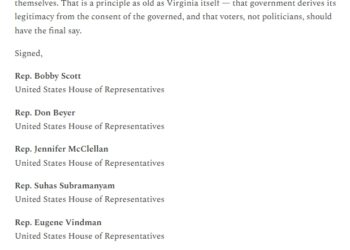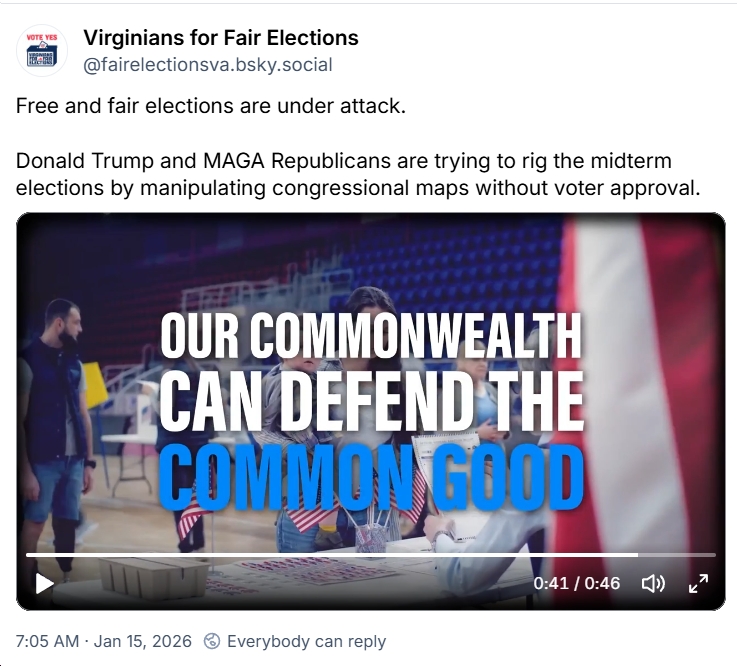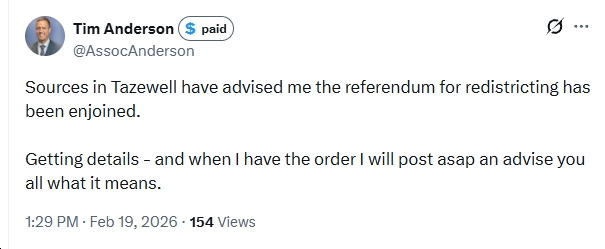by Cindy
I’m hearing a lot of rumblings within the grassroots community the last few weeks, that people no longer want to push for the redistricting constitutional amendment that passed out of last year’s General Assembly and needs to pass again–in its exact same wording–this year. Many of these people are the very same people who worked hard last year advocating FOR the amendment, calling and writing postcards to their legislators, running social media campaigns, sometimes even threatening to find primary challengers to legislators who refused to support the amendment.
Why the change of heart? Is it that now that Democrats are in the majority, we suddenly don’t believe in “little d” democracy anymore? Not really. But what’s happening here is EXACTLY WHY amending the constitution is made to be hard. It would be incredibly irresponsible to amend the constitution with something that came out of the rush and panic of one very short legislative session, where that “something” changed all along the way! Having to pass through the legislature a second time, and come before the voters gives us this time to look more carefully at what was passed, to be absolutely certain it will have the intended effects.
And it turns out that a careful look is exactly what this proposed amendment needs.
To recap how we got here, the session started with two potential versions: one was written by the bipartisan advocacy group One Virginia 2021 (which included Democrats but also right-wing extremist Ken Cuccinelli, and was carried in the legislature by Republican Sen. Glen Sturtevant) that wrote the legislature and the Governor entirely out of the redistricting process, but left open how maps would be drawn if the citizen redistricting commission could not come to an agreement on the lines. The second was patroned by Senators George Barker (D-39), Emmett Hanger (R-24), and Dick Saslaw (D-35), and put the redistricting process in the hands of a bipartisan commission that included both citizens and legislators, gave the legislature and the Governor a final thumb’s up/down vote, and named the judicial branch as the backup plan if the redistricting commission couldn’t come up with a plan the legislature and Governor could agree to.
While the plan to entirely omit the legislature from redistricting was quickly voted down in committee last session, the second plan for a joint citizen/legislative commission moved forward. Lots of tweaks were made to the resolution as it passed through both chambers and House and Senate versions were reconciled. One Virginia 2021 has given its full support to the amendment that passed the legislature.
Ultimately, it was a compromise that Republicans in the legislature–who have long held the majority, but who feared they might lose that majority in November 2019, as they ultimately did–and Democrats in the legislature — who have been kept in the minority in large part due to gerrymandered districts–could agree to. We can speculate about the motives of either side. But at the end of the day, this is the amendment that passed, and this is the only thing that now can be enacted in time for the redrawing of districts that will follow the 2020 Census.
One major concern I’ve heard about the amendment centers on the fear that because the map-drawing will be left in the hands of the extremely conservative Virginia Supreme Court if the commission fails to reach an agreement, there is less incentive for conservatives on the commission to work in good faith towards a nonpartisan set of maps. Another concern is that there is no guarantee that the commission be representative of all Virginians–demographically, geographically, or socioeconomically. The thinking is that a commission of wealthy, white people from Richmond will draw maps very differently from a more diverse commission. (This can be written into what is called enabling legislation, but that is subject to the political swings of the legislature.) In fact, the entire process of how citizens will be picked for the commission can easily be subject to manipulation.
So, there are good reasons to be concerned, and many people are. More discussion clearly needs to happen to decide whether this amendment is “good enough” to tie ourselves to for the next ten years or more. Hopefully there will be many opportunities to have those conversations. (There is one later today in Fairfax, hosted by the League of Women Voters; and Delegate Mark Levine and 1VA2021’s Brian Ross Cannon will debate the amendment on December 11th in Arlington.)
But, bottom line, if you were one of the grassroots activists who was adamant about passing this last year, even if you’re unsure now whether we should pass this, it was still the right thing to do, because it bought us this extra time to give it this serious consideration. Please do reach out to your legislators once again to have new conversations with them about your concerns. (Don’t worry, they won’t think you’re nuts for questioning something you asked them to support!) And if you were one of the legislators who voted either for or against this last year, know that the grassroots wants to hear what you’re thinking now about this amendment.


















